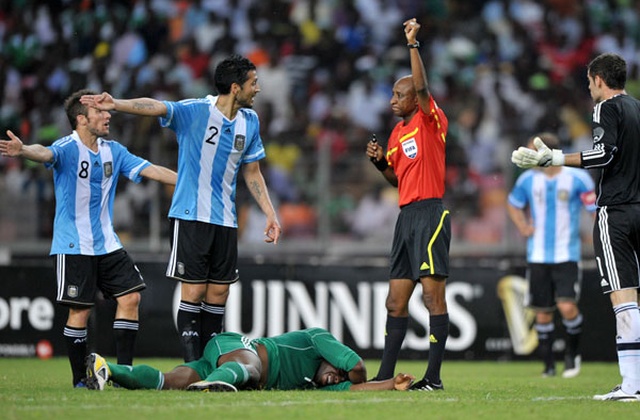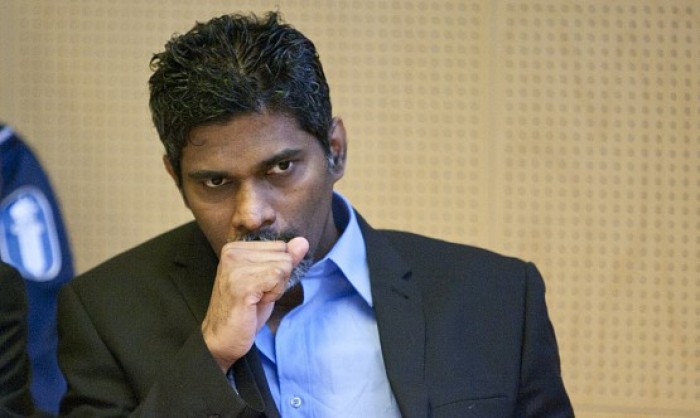By Andrew Warshaw
January 10 – FIFA’s head of security has once again cranked up the publicity machine in the war against match fixing with fresh evidence of the scale of the problem worldwide.
Chris Eaton (pictured), who recently told insideworldfootball that lives were at risk but that over 20 players had nevertheless already come forward to blow the whistle, gave further details today of the attempt to bring the criminals to justice.
“We are very concerned about the safety of players [and] officials,” Eaton told a media briefing in Zurich.
“There is anecdotal evidence that some players have been killed.
“Match fixing is all about stealing money.
“It destroys the lives and careers of many people.
“Governments should be interested because the amount of money is truly staggering.”
FIFA is opening a hotline and website, in 180 languages, for whistleblowers offering amnesties for anyone who can give proper incriminatory evidence against the guilty parties.
Eaton revealed that FIFA is still trying to contact the man who officiated in a friendly between Nigeria and Argentina in June.

Referee Ibrahim Chaibou (pictured) of Niger awarded two controversial penalties in Nigeria’s 4-1 win but FIFA has been unable to contact him since.
Match fixing and illegal betting has reached such alarming proportions that the former coach of South Korean club Sangmu Phoenix was found dead in October in an apparent suicide, three months after being charged as part of the new crackdown.
“We have evidence of players in South Korea committing suicide because of the shame of match-fixing,” said Eaton.
“There are players who pay the ultimate price for resisting or for the shame of match fixing.”
Those who were coming forward, he warned, did so under fear of reprisals.
“Most are indicating they are under some form of threat,” Eaton revealed.
“Often these players are under the control of a senior player, or captain, or technical coach, and these are the people we need to support.”
Turkey, Croatia and Italy have all been highlighted in recent weeks and Eaton promised FIFA would protect witnesses who helped in the syndicate-busting campaign.
“If they come forward and have valuable information…they will be protected,” he said.
“I have that commitment from FIFA.”
The former Interpol official says FIFA’s latest campaign depends largely on cooperation from players, officials and administrators.
FIFA will offer amnesties for just three months to those reporting their own involvement in fixing scams.
“We are providing them with someone to go to,” Eaton said.
Eaton cited the example of Italian defender Simone Farina, who informed law enforcement authorities that he was offered $255,000 (£165,000/€200,000) last year to help fix a second tier match involving his club Gubbio.
“He resisted and rejected a corrupting offer, but more importantly he reported it,” Eaton said.
Farina was appointed a FIFA fair play ambassador by FIFA President Sepp Blatter on Monday.
Eaton said he and his team of investigators had travelled to 60 countries last year in the fight against match fixing, much of it linked to illegal gambling syndicates in southeast Asia.
FIFA estimates that fixers make between $5 billion (£3.2 billion/€3.9 billion) and $15 billion (£9.7 billion/€11.7 billion) in profit each year from manipulating matches across all sport.

Their biggest catch so far is Singaporean businessman Wilson Perumal (pictured) who was arrested in Finland and jailed for two years, while nine players – including seven Zambians – were given suspended sentences for trying to fix matches in Finland.
According to information released to reporters by Eaton, Perumal promised to pay one unidentified official $100,000 (£64,600/€78,300), with a pledge of $500,000 (£323,000/€391,300) from future matches.
“Please ensure a friendly is arranged and let’s get down to business…your economy is down and money is crucial,” he apparently wrote.
And in another document, he added: “I have some youth tournaments coming up.
“I will send invitations to you and once you are here we will sort out the rest.
“These games are exhibition matches and please don’t make my life difficult by saying you want to win and so on.
“Trust me there is good money to be made.”
In emails, Perumal questioned how FIFA could stop match fixing.
“If the parent body is corrupt, how is it going to eradicate corruption in football?” he wrote before eventually getting caught himself.
Contact the writer of this story at zib.l1745124649labto1745124649ofdlr1745124649owedi1745124649sni@w1745124649ahsra1745124649w.wer1745124649dna1745124649
Related stories
January 2012: The scale of the match fixing problem is frightening, warns FIFA’s head of security
December 2011: Exclusive – Footballers help FIFA gather match-fixing evidence
December 2011: Gold Cup matches may have been fixed, warns FIFA security chief
October 2011: FIFA’s head of security continues to encourage whistleblowers with rewards
August 2011: Exclusive – FIFA’s head of security calls for financial rewards for whistle-blowers

